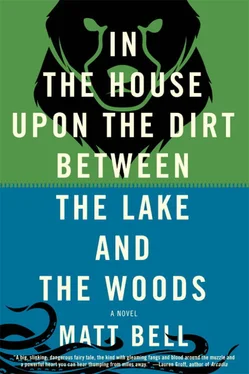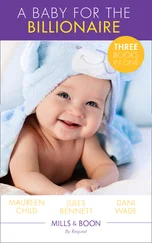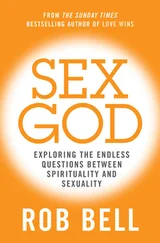No, I did not, for what other answer was there that he would accept?
WHEN THE FOUNDLING NEXT AWOKE, I fed him the rest of his rabbit, then worked the warped iron of our stove to heat him some water, found him soap to bathe away the last of his fever smell.
I waited while he scrubbed and dried and dressed, and then I begged him to speak, to tell me of his mother, of my wife.
I said, Tell me it all, and do not stop, no matter what you see upon my face or what I do with my hands.
I said, I am not always in control of who I am, but I do not want you to be afraid of me, not anymore.
The foundling nodded, and then he said he knew, that he had long known.
He said, My mother showed me the man you used to be. She made many rooms to show me, and also to show you, so that when next we were together you would be yourself again, your right self, and we would not have to be afraid.
He said, She made a house for you, put all of herself inside it for you to recognize, but even after you saw what she wanted to say still you never came to where we were, although often we thought that you would.
He said—and here I heard his adult voice most, a deepness hidden within his child-shape—he said, Do you know how sad it made her to have you refuse her forgiveness? Do you know how sad it made me, to find you out in the woods, playing with your stupid traps?
The foundling and his mother had listened for my footsteps, and then my longer periods of stopping, resting or else slow consideration. He said that sometimes his mother said she heard me running, that I was moving faster now, that at last I was coming and that soon we would all be reunited.
Other times, he said, I would pause so long that they wept for fear of my death, for his mother said only the collapse of my bones could have stopped my advance, could have kept me away.
The foundling said he’d watched his mother waste herself to make the deep house, singing her bones inside out, making of her sweat salty rivers in which to cool my face and of her flesh banquet rooms in which to feast my hunger—but I remembered no such meals, and told the foundling so.
Certainly there were rooms of flies and rooms of maggots and rooms of garbage, I said. Certainly there were poison-rimmed goblets, plates powdered with pressed privet, tetanus-stilled beasts caught in rusty traps.
The foundling shook his too-small head, stopped the advance of his story.
Mother said you’d say that, he said.
He said, She said you were afraid of her, and also of me. That something had put a fear in you, and that now you were wary. And still she said we should wait for you to arrive, still she said you would arrive transformed.
What if deep house was not all there was beneath the earth? What if there was deep dirt ? What if there was deep woods and deep lake ? What if my wife was then making some new world beneath the dirt, and only my cowardice atop the great stairs had kept me from reaching it, from taking part in its reconfigured elements?
What if I could become deep father and she deep mother and the foundling or the fingerling our deep child , and what if the whole world I had known—all that lake and dirt and house and woods and bear and what was not a bear, all that father and mother and child and ghost-child and moon and moons—what if all that was failed forever, doomed by our years of childlessness, our despair over those long years?
What if my wife had known how to leave it all behind? What if she had tried to tell me, and what if I had not listened?
EXHAUSTED OF HIS STORY, THEfoundling slept in my lap, and as he slept I stroked his hair as I had stroked my wife’s, as I had once hoped to stroke the fingerling’s, when I still imagined he might be a boy.
And how the fingerling hated this substitution, the equivalency it suggested, and how he wished me to stop.
How he knew what I was doing, what I planned to do next, and as warning he filled me with his black feelings, attempted to rob me of my enjoyment, my small joy at this first night of new fatherhood, and with his movements he kept me even from sleep, from indulging in my exhaustion to take some simple slumber of father and son. I held the foundling, and the fingerling moved agitated within me, and soon I began to feel some dull pain in my shoulders, then my arms and hands.
A prickling, then a numbness, then the prickling again.
Soon my jaw ached, and I shifted the foundling so that I could free one hand to rub at its joint, then to clear the sweat from my forehead.
I had barely eaten since the arrival of the foundling, but now I felt like I had eaten too much, and if I could not still my stomach then I thought I would have to wake the foundling, send him to sleep somewhere else.
Last I felt the squeezing in my chest, like a fist wrapped around my heart, its grip bearing down, then letting up, then bearing down, a kind of contraction I had never before known, and at this touch I knew the fingerling’s intent, recognized his goal even if he kept silent as he worked. In the years of our long cohabitation he had found his way into every part of my shape except my head and my heart, but now he moved to enter fully my centermost chamber, and I felt him move to block that pulsing organ, shaping his many bodies into some plug or plugs with which to stop me where I sat, and when his work was complete I seized in my chair, the jerking of my body so violent it bucked the foundling from my embrace.
I grappled dumbly at my chest, pounded the skin and sternum that separated my hands from my heart, and as I floundered the awakened foundling dragged me gasping from my seat and onto the rough-boarded floor of our house. I spasmed upon the boards, and soon I could not feel my pulse or my breathing, but still I sensed the fingerling everywhere now, every part of him on the move, and against him I sensed the foundling working from without, setting his hands upon my chest, his lips on my lips. And when that failed he began to speak, and then his speech turned to song, made a new music that even in my dying I knew I had never heard before.
The song the foundling sang was not just sound but also smell and sight, also touch and taste, and also light, also not-black— and with it the foundling drove his brother out of my center, back to my stomach, to my thigh, those first hiding places now again made far from what remained of me—and when the fingerling was secured, my body jerked upon the floor, all of me weakened and sweat soaked and in terrible pain.
But even in my pain I found a reveling, this returned life worth celebrating: For a moment all I felt was the glorious pounding of my heart, the busy way my lungs bellowed, that first breath so filling my chest with air that I thought I might never have to breathe again.
FROM UNDER THE WOODS THEbear had brought back all I had killed and buried, roaring them from the burying ground into new and uncut threads, perhaps diminished shades of their former shapes but at least not dead. That too was how I returned, lessened of some portion of my manhood, of what awful man I had been, but also of what protections the bear had given me: Soon my adrenaline faded, and then I began to wheeze, and then also to hack, until I expelled some number of dark clots onto the floor. Afterward the foundling helped me back into my chair, then sat down, crossed his legs before me. Even that short climb winded me, and in my chair I gasped for air, clutched at my chest. The pain radiated everywhere except the places the fingerling had been driven, and in those holdings numbness prevailed.
Despite some lingering nausea, I felt the fullness of my appetite return, a ravening long ago put aside, now returned to announce my restored need, and then suddenly I realized the foundling was speaking and that I had not been listening. I pulled myself straighter, then slumped again, placed my elbows unsteady upon my knees, let my head tilt to one side or the other. From that stance I could not see the foundling’s face well, and as he talked I struggled to understand the words he made, his stuttered syllables high pitched and softly spoken. I asked him to start again, to speak slowly until this story was told, the only story that had ever happened to him alone: not the story of his time with my wife in the deep and deepest houses, but of his journey away from her side.
Читать дальше












